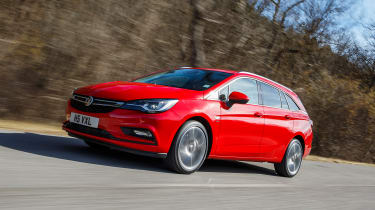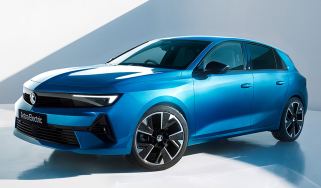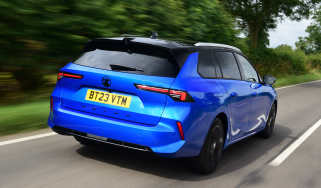Vauxhall Astra Sports Tourer estate (2016-2021) - MPG, running costs & CO2
Running costs for the Vauxhall Astra Sports Tourer should be affordable, but resale values are likely to be poor
This is an area where affordable family cars need to do well in order to compete strongly with rivals. Thankfully – for Vauxhall at least – the Astra estate does just that. There’s a huge range of efficient and powerful petrol and diesel engines on offer, while maintenance and servicing shouldn’t be too pricey either. If there is an area of concern, it’s depreciation – something that the Astra (in any bodystyle) has traditionally struggled with. Whether or not this holds true for this latest version remains to be seen.
Vauxhall Astra Sports Tourer MPG & CO2
As part of a 2020 facelift, the Astra Sports Tourer is now offered with a simplified range of three-cylinder petrol and diesel engines. They range in power from 104 to 143bhp, are 1.2 to 1.5 litres in size and are all reasonably efficient.
If running costs are your biggest concern, then you should probably go for one of the 1.5-litre diesels. The most efficient of these – the 104bhp 1.5-litre equipped with stop-start technology – will return around 65mpg on average, with CO2 emissions of up to 114g/km. Opt for the more powerful 120bhp version of the same engine, and fuel economy drops to just over 62mpg with emissions of up to 118g/km.
More reviews
In-depth reviews
- Vauxhall Astra review - striking hatchback with updated tech
- Vauxhall Astra Sports Tourer review - versatile family estate
- Vauxhall Astra Electric review - household name with an EV twist
- Vauxhall Astra hatchback review (2015-2021)
- Vauxhall Astra Sports Tourer estate (2016-2021)
Used car reviews
Both diesel engines comply with the stricter RDE2 emissions regulations, meaning they avoid the additional 4% surcharge levied against non-compliant diesel models. This means both diesel engines sit in a mid-range Benefit-in-Kind (BiK) tax bracket, making them an affordable option for company-car drivers.
Each of the turbocharged 1.2-litre petrol engines is capable of 50.4-53.3.mpg, regardless of whether you pick the 109bhp, 128bhp or 143bhp version. It’s only available with a six-speed manual gearbox and produces CO2 emissions across the range of 122-128g/km, placing it in a mid-range BiK banding for company-car drivers.
The 1.4-litre petrol engine is only available with Vauxhall’s ‘Stepless’ automatic gearbox, and produces 143bhp. It’s less efficient than the smaller 1.2-litre engine as well, with fuel economy falling to 46.3-48.7mpg and CO2 emissions of 134-139g/km making it difficult to recommend unless you really need an automatic.
All Vauxhall Astra estates will attract road tax of £150 a year.
Servicing
Maintaining your Vauxhall Astra Sports Tourer shouldn’t cost too much, as servicing is required every 12 months or 20,000 miles – whichever comes first. These alternate between interim and main services and start from around £150. You can also sign up to a Vauxhall Care service plan, which costs from around £20 a month and includes three services, three years of roadside assistance and the cost of the first MOT.
Warranty
Unfortunately, Vauxhall’s ‘Lifetime’ (100,000-mile) warranty is long gone and has been replaced by a more standard three-year warranty, which has no mileage limit on the first year, but over the full time span is only valid for up to 60,000 miles. This is about on par with rivals, although Hyundai’s five-year/unlimited-mileage warranty and Kia’s seven-year/100,000-mile cover are both much more generous. Toyota also offers a five-year unlimited mileage warranty.
Insurance
In terms of insurance group ratings, the Astra Sports Tourer sits in groups 8 to 20, depending on which version you go for – the more powerful the engine and the higher the trim level, the more it’ll cost to insure. This is about the same as rivals like the Volkswagen Golf Estate and Ford Focus Estate.















